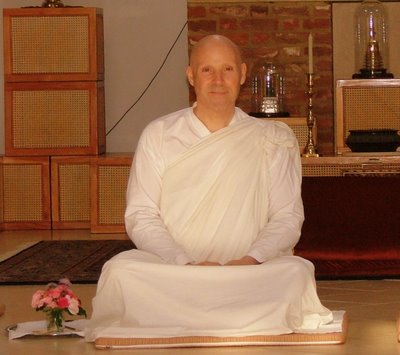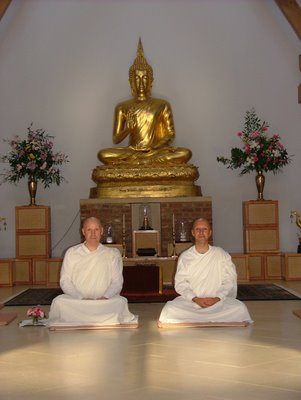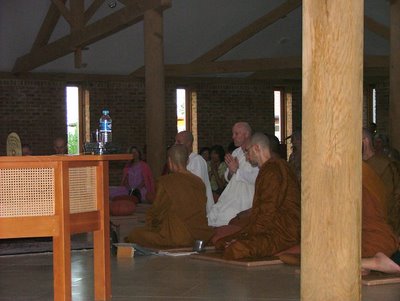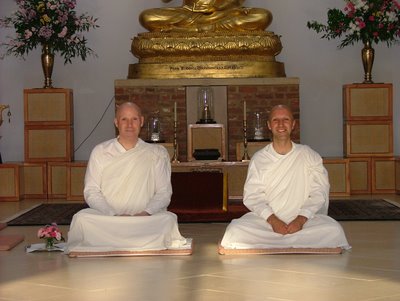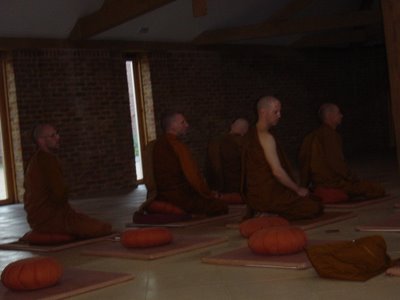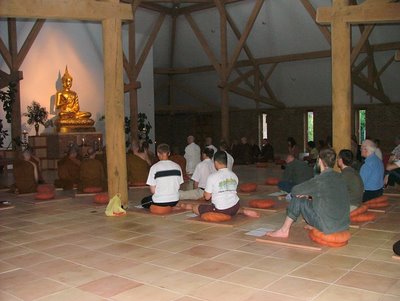Friday, June 01, 2007
Last British Post
Tuesday, January 02, 2007
This is an eternal Law
"Camera footage of the final minutes of Saddam Hussein released yesterday shows him being taunted by Shia hangmen and witnesses, a scene that risks increasing sectarian tension in Iraq.
As he stood at the gallows, he was tormented by the hooded executioners or witnesses shouting at him to "Go to hell" and chanting the name "Moqtada", the radical Shia Muslim cleric and leader of the Mahdi army militia, Moqtada al-Sadr, and his family.
The grainy images, which appeared to have been taken on a mobile phone, disclose exchanges between Saddam and his tormentors, the moment when his body drops through the trapdoor, and his body swinging, eyes partly open and neck bent out of shape. In what Sunni Muslims will perceive as a further insult, the executioners released the trapdoor while the former dictator was in the middle of his prayers."
NPR Audio: click here
Dhammapada verses:
- What we are today comes from our thoughts of yesterday, and our present thoughts build our life of tomorrow: our life is the creation of our mind. If a man speaks or acts with an impure mind, suffering follows him as the wheel of the cart follows the beast that draws the cart.
- He insulted me, he hurt me, he defeated me, he robbed me. Those who think such thoughts will not be free from hate.
- For hate is not conquered by hate: hate is conquered by love. This is a law eternal.
Claudiney - you are not alone, little one
 http://www.flickr.com/photos/beija-flor/3968196/
http://www.flickr.com/photos/beija-flor/3968196/Claudiney hangs on to the only living creature he feels he can trust. They share their lives on the streets of São Paulo but still they're both capable of bringing forth those delightful smiles.
No matter how genuine your feelings of sorrow and anguish might be, they alone will do nothing to alter the course of Claudiney's life, at the link below you can do something that will help:
http://www.dreamscanbe.org/view/205
A Ladle in a Soup Pot

"Someone commented, I can observe desire and aversion in my mind, but its hard to observe delusion. You're riding on a horse and asking where the horse is! was Ajahn Chah's reply."
"Dhamma is in your mind, not in the forest. Don't believe others. Just listen to your mind. You don't have to go and look anywhere else. Wisdom is in yourself, just like a sweet ripe mango is already in a young green one."
"Of course, the Dhamma books are correct, but they are not right. They cannot give you right understanding. To see the word anger in print is not the same as experiencing anger. Only experiencing yourself can give you the true faith."
"If you listen to the Dhamma teachings but don't practice you're like a ladle in a soup pot. The ladle is in the soup pot every day, but it doesn't know the taste of the soup. You must reflect and meditate."
Saturday, December 16, 2006
Mallonga ĉirkaŭrigardo de Vihāra Brief Vihāra Tour


Jen estas parta vido de nia eta ekzercoĉambro. Mi devus pli ofteviziti ĝin por bonteni mian sanon.

Tio ĉi estas unu el niaj du duŝoj. Ni razas ne nur nian barbon sedankaŭ nian hararon kaj brovon sufiĉe ofte. Mi razas min en la duŝo- -- la 100%-a humido ebligas pli efikan razon.

Tio estas antaŭnelonga aldono al la vihāra-o -- lavmaŝinon! Antaŭtiu donaco, ĉiu lavis siajn vestaĵojn permane. Tio estis ne trofacila por la anagārika-oj, ĉar ni vestiĝas nurblanke!

La kuvetoj estas apud la lavmaŝino kaj la duŝoj. Ili uziĝas porraziĝo kaj dentobrosado.

Ni pendas niajn vestaĵojn de tiuj ŝnuroj en la ĝardeno por sekiĝi(kiam la suno brilas). Se pluvas, ni pendas ilin en la sekiga ĉambromalantaŭ la sālā. Kiel vi vidas, bhikkhu-oj vestiĝas brune.

Bruligota ligno seke konserviĝas ĉi tie -- protektita de la tipebrita malseka vetero.

Iom verda angulo de nia zenĝardeno

Norda vido de la zenĝardeno -- kiel vi vidas, mi ne emas enrastiturbulajn paralelajn liniojn, kiel fariĝas ĉe kelkaj japanajmonaĥejoj -- mi preferas lasi la gruzon tia, kia ĝi estas.

Krom nia matena laboro, ni faras ĉiutagan taskon: mi balaas la kvinenirejojn de la vihāra -- ĉi tie vi vidas la padon, kiun mi ĉiutage balaas.

Vido de la malantaŭa korto, laŭ okcidenta rigardo

Suda vido de la korto

Malalta vido de la korto laŭ orienta vido -- rimarku la fungojn:Britio estas iom pluvema.

Okcidenten el la malantaŭa porĉo -- dekstre vidiĝas la mia ĉambraverando.

Nord-okcidenta vido de la verando

Norden tra la travidebla verando vidiĝas la enirejo de mia ĉambro.

Tio estas mia almozujo -- plenigita ĉiutage (krom dum fastado) de ladāna (la malavareco) de aliuloj. Laŭ la monaĥaj Preceptoj, nidaŭre strebas indi je la donaco de aliuloj.
This is my mendicant bowl ˿ filled everyday (except when I fast) by others' dāna (generosity). Following the monastic Precepts, we constantly strive to remain worthy of other's gifts.

Miaj ŝrankoj enhavas ne-Dhamma-ajn librojn, KD-ojn kaj DVD-ojn. Miaparte ĝuas lingvojn, historion, poezion kaj dokumentariojn.
My cupboard holds non-Dhamma books, CDs and DVDs ˿ in particular I enjoy language, history, poetry and documentaries.

Mia dormloko, kie mi ripozas po sep horoj nokte.
My sleeping place ˿ where I rest mostly seven hours every night.

Mia skrib- kaj leg-tablo, kaj Dhamma-libroj
My writing/reading table and Dhamma books

Mia unua vido de la mondo kiam mi eliras mian ĉambron
My first view of the world when I leave my room

La granda bildo, por ĉion perspektivigi☺
The big picture ˿ for the sake of perspective ☺
Friday, October 13, 2006
Freedom of Choice in a Beautiful World
- The mass slaughter continuing over vast expanses of the Middle East
- An anti-gay voting, homosexual Florida Republican congressman chatting up underage pages
- The US producing most world greenhouse gases yet doing little to nothing to stop
- Young people without career prospects joining the military as their only work option
- Christian fundamentalists falling for Republican pandering, etc., etc., etc.,
And if all goes well November 7th, then we can all sing:
http://www.youtube.com/watch?v=ObVxM-KOZKo
Sunday, October 08, 2006
Pavarana Day Photo
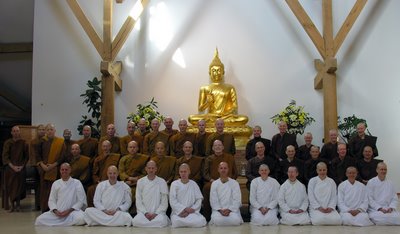
(By the way, to see a larger version, just click on the photo.)
Saturday, September 30, 2006
Autumn Albion
I hope these words are both entertaining and informative.
Fasting self-retreat
 The Amaravati community is nearing the end of Vassa – the traditional South Asian Rains Retreat. During this time the monastics are allotted a certain span of time for solitary retreats called “self-retreat”. As an anagārika I was slotted for 10 days from September 15th until September 24th. During that time I also underwent a three-day full fast, i.e. eating nothing at all and curbing my intake to drinking 2 litres of water each day.
The Amaravati community is nearing the end of Vassa – the traditional South Asian Rains Retreat. During this time the monastics are allotted a certain span of time for solitary retreats called “self-retreat”. As an anagārika I was slotted for 10 days from September 15th until September 24th. During that time I also underwent a three-day full fast, i.e. eating nothing at all and curbing my intake to drinking 2 litres of water each day.The fasting process spanned more than the three days of complete fasting, however, because in order to accustom the body to the upcoming scarcity of food one gradually consumes less leading up to the full fast and on the other side slowly eats a bit more each day coming out of the fast. Thus, the entire fasting process involves 9 days: 3 days in, 3 days there and 3 days out. One of the senior monks who'd attended medical school before donning the robes was a welcome font of prudent, professional advice.
The fasting teaches a primal lesson about food on a gut level (no pun intended!): its role is solely nutritional. On a strictly biological level, it is not meant to “entertain” to fight boredom, or to “drug” to enhance moods. Frankly, were it possible, taking a daily nutrition tablet would be preferable and thus be done with the non-biological aspects of consuming nutrients.
Lastly, stepping on the scale, I was somewhat struck to glimpse that I'd shed almost 1 stone (6 kilos) during the fast. For the nonce, they've not re-emerged. In fact, that new attitude towards food lingers on and I at present carry on eating light fare and glean food not for taste but merely for its nutritional value.
Odyssey
The other day I was pondering the odyssey that I've slogged since having bid farewell to the householder life. More than one year on, I recall the all-day drive by my pal Brandon on Interstate Highway 5 down to my erstwhile new home in San Diego.
There I was slated to take Buddhist College courses in preparation for becoming a monk in the Chinese Mahayana tradition. Then, as it turned out, once in Taiwan the huge Fo Guang Shan complex and people made such a favourable impression that, at their invitation, it was easy to make a decision to stay there, rather than return to San Diego, where I would be in daily contact with an imposed mentor, with whom I felt no heart connection whatsoever.
Then, having realised that the Mahayana was definitely not for me, the culminating phase finds me living as an anagārika in the Theravāda Buddhist tradition here in the United Kingdom. What a strange trip it's been!
Now, however, I am where I want to be.
Corporations
It was acutely distressing not long ago to come upon a Guardian Weekly report that Britain's leading scientists have challenged the US oil company ExxonMobil to stop funding groups that attempt to undermine the scientific consensus on climate change – their motive would seem to be in order to protect their profits. Human history provides not a few precedents to such cold-hearted callousness (e.g. slavery, tobacco companies and coal mining companies in relation to lung disease, construction material companies and asbestos, etc.); nonetheless, that degree of barefaced selfishness and disregard for the well-being of others (including their own progeny) still utterly stuns me.
I frankly cannot grasp how people can be so short-sighted and self-centred to jeopardise the welfare of the whole world merely to garner more profits for themselves. Viewing material possessions as transient (anicca) and one's self as an illusion (anattā) only serves to spotlight the folly.
Thus, along the same line, I applaud the California attorney general's suit against automobile corporation greed and sloth in offering the public more environmentally friendly cars. I singularly back his litigation, because the federal government is luridly doing nothing to counter corporate avarice and, quite to the contrary it could be argued, is legislatively facilitating it.
British Empire – American Empire

A few days ago, I finished watching a captivating video entitled “A History of Britain” by Dr. Simon Schama. An episode that deals with the British Empire at the turn of the last century intrigued me particularly, as a native-born American, because it depicts how ill-placed was the sense of invincibility felt by the British in the years prior to World War I.
One can easily liken what did happen to the British Empire to what is and will happen to present American Empire. The British held tightly to the mirage of an almighty, durable empire that would span the globe and failed to spot the first tottering dominoes of imperial ascendancy. One can witness the same process taking place in the American Empire. Those whom the American Empire has dominated for decades are no longer languidly slumbering in the face of that supremacy; e.g. Venezuela's Chávez, Brazil's Lula, immediately come to mind not to mentioned traditional allies in Europe.
Linux
Furthermore, as a samanera – the stage after anagārikaship – one no longer deals with money. Yet, because Linux has loads of high-quality, free(!) software, I won't need money to obtain quality freeware.
Lastly, and perhaps most significantly, Linux for the most part is an open-source, non-commercial enterprise. People write programs and supply content out of a sense of generosity and contributing to the Common Good. What a cordial contrast to the corporate motives.
New life skills
Since moving into the Vihara (monks' residence), I am pleased to be able to declare that I have acquired some very practical skills: sewing, gardening and cooking.
We anagārikas sport white-only clothing. So, when I first was given 3 pairs of white trousers to wear, I couldn't not avoid noticing that they were too long – my inseam measures only 73 centimetres. So, I had to take them up, which previously I'd left it to my mother or a tailor to undertake. I had never done so by myself before. One of the monks very patiently demonstrated how a sewing machine could get the job done. I learned fairly quickly and, voilà, was able to take up all six trouser legs by myself in the course of just one afternoon!
Following the instructions of those in the know about gardening, I've been awakened to how one properly pots a plant that has outgrown its erstwhile home as well as how one waters an desperately thirsty young willow.

In the kitchen, I've been trained to be a head cook and with the assistance of three help cooks have managed to prepare several meals for groups as large as 70 people. One of the first recipes I learnt was how to make the Indian dish, dal. In quick succession after that first recipe, I've leant to put together an edible salad dressing, ingestible mashed potatoes, and smooth hummus. Because I am a real cooking tyro, I've found it best to prepare simple meals keeping nutrition foremost in mind.
Anglo-Saxon Acculturation
 Having lived in England for well on nigh a year now, I am slowly acculturating myself to the country's day-to-day customs. Here are some that I've picked up:
Having lived in England for well on nigh a year now, I am slowly acculturating myself to the country's day-to-day customs. Here are some that I've picked up:When driving or walking on country lanes, one acknowledges those whom one encounters with a slight wave and a smile. This custom especially pleases me, because where I am from it is not common that one acknowledges the presence of strangers whom one encounters on the street. That disinclination to greet others is most likely due to the hordes of people whom one indeed meets in an urban setting. Yet, I find it wonderfully human to be in a situation where having encountered strangers one can greet them in a friendly manner.
Staying on the subject of locomotion, as one would expect in Britain, one habitually walks on the left. It only took me a few irked glances as other pedestrians circled around me while walking on the pavement (i.e. “sidewalk” in US English) in Berkhamstead and Hemel Hempstead to realise that being American I was getting it wrong by walking on the wr
 ong (i.e. right) side of the pavement. Since I've begun getting it right and correctly walking on the left, those irked glances have vanished and been replaced with pleasant smiles from those walking towards me.
ong (i.e. right) side of the pavement. Since I've begun getting it right and correctly walking on the left, those irked glances have vanished and been replaced with pleasant smiles from those walking towards me.Lastly, I've adopted the use of the multi-purpose word “cheers”. It can mean “you're welcome”, “thanks”, or “bye”. Thus, it has a larger field of meaning than even “aloha” in Hawaiian or “שלום” [shalom] in Hebrew.
I trust this little briefing has been pleasant and informative and look forward to hearing from all of you individually, as well.
Sunday, July 09, 2006
Anagārika ordination
Luang Por (Thai for "venerable father", i.e. He's 72 years old with 40 years in robes) Sumedho wanted us to be ordained before the start of Vassa (the traditional rains' retreat). In addition to our anagārika ordination Monday, the following Sunday two samaneras (from Sri Lanka and Portugal) were ordained as bhikkhus.
The Amaravati sangha is growing and it's international!!! ☺
Here are some photos of this very significant life event:
 Luang Por Sumedho sharing a laugh with Helena, one of Bruno's friends who flew in from Lisbon.
Luang Por Sumedho sharing a laugh with Helena, one of Bruno's friends who flew in from Lisbon.For more info on my ordination as well as other facets of Amaravati, please see our new website at:
Monday, June 05, 2006
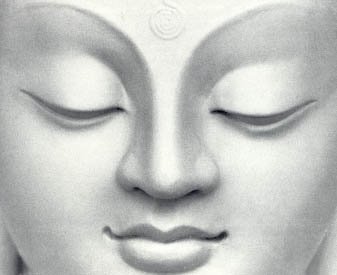
Skilled androgens and oestrogens
stir urges cloaked as caring.
To these are due “life's” origins
Witlessly offspring bearing.
Arising from primal sopor
Springs an evanescent “me”!
Mind burgeons from shrouded torpor
Thoughts gush out incessantly.
Dawning thought new sentience fashions
― deemed an individual.
Yet no centre drives its passions
Mere matter vestigial.
Groping by trial and error
Mind a hollow realm will shape;
Sprout thoughts both blithe and full terror.
A knotty snarl; whence escape?
“If I just had that cowboy hat,
Happiness would be all mine.”
Scarcely lies the gift-wrap flat
Longing's grail forfeits its shine.
A voracious rapacity
Latches onto more and more
Eclipsing any scarcity.
Do we sense the psyche's core?
Specious “self” abides unsated.
Greed, anger and delusion
cascade amok unabated.
Mind snared in view profusion.
For all that, do you hear the hush
Soothing the mad, musing rill?
The whole brooding, torrential rush
The sound of silence will still.
© Adin Eichler 2006
Friday, May 19, 2006
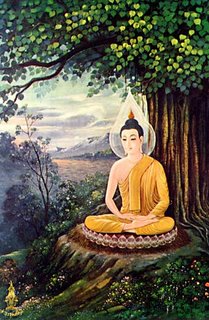
Ariya-Sacca
Suffering stays ubiquitous.
Its genesis is yearning.
To end it: yield the covetous
The Eightfold Path discerning.
The first steps mean deeds virtuous
On the Path we launch a start.
We watch with care assiduous
Heeding sīla with stout heart.
Right effort treks with mindfulness
As one with concentration.
Plumbed samādhi with skilfulness
Steers us towards liberation.
Consummate view and right resolve
Yield paññā as benefit.
Does the ego then dissolve?
If our practice does befit!
© Adin Eichler 2006
Friday, May 05, 2006
Anagārika in Avalon
 Well, lately my e-mail responses have been unequivocally sluggish. Is it too starry-eyed to hope that you will be magnanimous in accepting my alibi? Writing one-on-one to so many (How favoured to be nestled within the snug phratry of so many kindred hearts) has dreadfully impounded my free time.
Well, lately my e-mail responses have been unequivocally sluggish. Is it too starry-eyed to hope that you will be magnanimous in accepting my alibi? Writing one-on-one to so many (How favoured to be nestled within the snug phratry of so many kindred hearts) has dreadfully impounded my free time.That notwithstanding, I still very much want to sustain, even strengthen affinities with friends and acquaintances yet without needing to sacrifice personal time. What to do? Resuscitating this blog seemed the noetic path to tread.
Last week, Ajahn Vajiro words that I would soon be received into the basal monastic tier as an anagārika exhilarated me to my core. The last time that I experienced such exultation involved having earned tenure as a high school teacher. Although the analogy isn't wholly homologous; however, because it will be only in two years' time that the tantamount monastic status will have been conferred.
Becoming a fully ordained monk in the Theravada (Southern) Buddhist tradition and specifically in the Thai Forest Tradition of Ajahn Chah stipulates three levels of training: anagārika, samanera and bhikkhu.
Clearly, an anagārika occupies the most rudimentary tier. During this period of usually one year, one lives the monastic life following the Eight Precepts and assesses how monastic life suits one. The Eight Precepts are:
1. Pānātipātā veramaņī sikkhāpadaŋ samādiyāmi
I undertake the precept to refrain from destroying living creatures.
2. Adinnādānā veramaņī sikkhāpadaŋ samādiyāmi
I undertake the precept to refrain from taking that which is not given.
3. Abrahmacariyā veramaņī sikkhāpadaŋ samādiyāmi
I undertake the precept to refrain from sexual activity.
4. Musāvādā veramaņī sikkhāpadaŋ samādiyāmi
I undertake the precept to refrain from incorrect speech.
5. Surāmeraya majja pamādaţţhānā veramaņī sikkhāpadaŋ samādiyāmi
I undertake the precept to refrain from intoxicating drinks and drugs which lead to carelessness.
6. Vikālabhojanā veramaņī sikkhāpadaŋ samādiyāmi
I undertake the precept to refrain from eating at the forbidden time (i.e., after noon).
7. Nacca-gita-vādita-visūkkadassanā mālā-gandha-vilepana-dhāraņa-maņdana-vibhūsanaţţhānā veramaņī sikkhāpadaŋ samādiyāmi
I undertake the precept to refrain from dancing, singing, music, going to see entertainments, wearing garlands, using perfumes, and beautifying the body with cosmetics.
8. Uccāsayana-mahāsayanā veramaņī sikkhāpadaŋ samādiyāmi
I undertake the precept to refrain from lying on a high or luxurious sleeping place.
The third and final stage is bhikkhu ordination: at that point one takes on 227 Precepts, which more often than not merely refine the samanera's Ten Precepts. These Precepts support the bhikkhus in pursuing lives of renunciation and simplicity. That's the process in a nutshell. :-)
Besides my anāgārika vows, I'll be shaving off not only my beard and head hair but also my eyebrows! As an anāgārika, I'll wear only white. I'll also take part in special Dhamma classes. Otherwise, my daily routine will be the same.
Daily monasterial schedule
04:00 wake-up and shower
05:00 morning meditation and puja
06:30 chores
07:15 gruel
08:30 ca. 2½ hours of work [5 days only)
11:00 meal
17:00 tea time
19:30 evening meditation and puja
Everyone passed along to me exclusively supportive observations. However, exercising some self-critique, any trenchant observer would have recognised that I'd cooked much too much. I must learn to appraise suitable measures. Oh, well, it was my first time.
Friday afternoon it was a joy to go on a meandering, brisk stroll along some of the monastery’s flanking rustic roads with two newly arrived guests: a bloke from Manchester and a Czech lad from Prague. The former chatted about how proliferating thoughts doggedly nagged him to the point that he on occasion believed he was going barmy. Crestfallen, he moaned that from the hour he roused himself at daybreak until he lay down to doze at night, well-nigh identical ruminations unremittingly beset his psyche. He conceded that at times his awareness was so cramped “within his head” that he “lost contact” with his physical surroundings. I reassured him that it is our genetic lot to be doomed to this endless conceptualisation. Typically, Buddhists often dub it “papañca”. I cautioned him that such prolific thinking is as involuntarily and natural to homo sapiens as the emersion of an itch on the skin, the eyes blinking, or the mouth watering: it befalls us all. BUT, I asserted forcefully that Sartre had it wrong: there IS a way out and that “exit” is meditation.
It is certainly surprising that that bare counsel amounted to such a startling newsflash to this twenty-something, sharp-witted, Northern chap. Quite inconsistent with the austerity of such a titbit of advice, those simple words frankly magnetised the young Mancunian. A mere down-to-earth account of how spot on meditation is in soothing and unfettering the mind did not seem worthy of his copious thanks. Meditation does not relate whatsoever to any Abrahamic doctrinaire moralism but rather to a hands-on know-how that encourages folks to look autonomously into the self-same breadth and depth of their very lives. Having for themselves thus swept open the gateway onto the all-embracing vastness and yawning profundity of Anattā (non-self), with self-confidence born of insight they can sovereignly plot their own path to freedom.
Thursday, March 09, 2006
Anthropology and Science
 Here are my thoughts on two books that I've read of late:
Here are my thoughts on two books that I've read of late:One is called "Watching the English: The Hidden Rules of English Behaviour" by Kate Fox
(ISBN 0 340 81886 7)
In essence, she talks about the average English person's uneasiness in social situations. She describes it as "Social Dis-ease".
She also made a outline of core Englishness:
Reflexes = humour, moderation, hypocrisy
Values = fair play, courtesy, modesty
Outlooks = empiricism, eeyorishness, class-consciousness
So far, my experience confirms what she writes. I also got some insight into my own behaviour, because I became conscious of the fact that I share a lot of these English characteristics, just because I speak the English language and was raised in an Anglo-Saxon-influenced environment.
I know Marx would be smiling in his grave to know that I especially share the English trait of class consciousness: "A working-class hero is something to be...."
Here's a list of words that Fox put together that are deemed "forbidden words". They're forbidden because they betray class origins ( LC="lower" class / UC="upper" class):
LC UC
2 toilet vs lavatory
3 serviette vs napkin
4 dinner vs supper
5 settee vs sofa
6 lounge vs living room
7 sweet vs pudding
 The second book that I've recently read is "The Fabric of the Cosmos" (ISBN: 0375727205) by physicist author Brian Greene. Obviously, I'm sure that it wasn't Greene's intention, but having read the book has significantly strengthened my confidence in the Dhamma.
The second book that I've recently read is "The Fabric of the Cosmos" (ISBN: 0375727205) by physicist author Brian Greene. Obviously, I'm sure that it wasn't Greene's intention, but having read the book has significantly strengthened my confidence in the Dhamma.Greene emphasizes that the universe has always been transforming itself from a states of relative order to states of ever increasing disorder. He calls this process "entropy", which corresponds to the Buddhist concepts of "anicca" (= impermanence).
We human beings seek order. Thus, Newton and even Einstein sought a predictable order in the universe. Of course, when confronted with the physical fact of Bohr's quantum mechanics and Heidegger's Uncertainty Principle, where there just isn't a predictable order, that caused Einstein concern ("God doesn't play with dice."). Things by their very nature are unpredictable. The quantum facts of life do not allow us to predict/"control" phenomena: sometimes the superstring vibrates this way, sometimes that way: it's random. This quantum fact is consistent with the Buddhist concept of "dukkha" (= things not running smoothly as we might prefer.)
 Lastly, Greene at length discusses nonlocality (e.g. Bell's Theorem), in which two related (I think the term used in physics is "entangled") particles react to identically the same stimulus that however is only applied to one of them. The two particles although separated by perhaps huge distances react identically: e.g one particle's "spin" is changed at point A, then its related particle at a very distant point B is changed in exactly the same way instantaneously! Greene uses this laboratory result to demonstrate that our universe is a whole: every "thing" is connected to every other "thing". The division of the whole into distinct units is an illusion. We are all part of the self same fabric of the cosmos. This cosmic interconnectedness, of course, corresponds to the Buddhist concept of "anatta" (= non-self; non-separation of phenomena).
Lastly, Greene at length discusses nonlocality (e.g. Bell's Theorem), in which two related (I think the term used in physics is "entangled") particles react to identically the same stimulus that however is only applied to one of them. The two particles although separated by perhaps huge distances react identically: e.g one particle's "spin" is changed at point A, then its related particle at a very distant point B is changed in exactly the same way instantaneously! Greene uses this laboratory result to demonstrate that our universe is a whole: every "thing" is connected to every other "thing". The division of the whole into distinct units is an illusion. We are all part of the self same fabric of the cosmos. This cosmic interconnectedness, of course, corresponds to the Buddhist concept of "anatta" (= non-self; non-separation of phenomena). Thursday, February 02, 2006
British Buddha
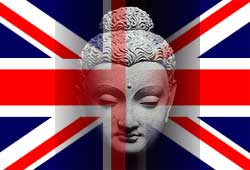 Having finally settled down in Britain, I can now inform you how I got here by telling you about what's been happening over the last couple of months.
Having finally settled down in Britain, I can now inform you how I got here by telling you about what's been happening over the last couple of months.November 5th I left Taiwan, having said rather poignant farewells at the airport to venerables Hui Mu and Hui Shou (the former from Taiwan and the latter from Austria) with whom I had got on extremely well. Not only they, but everyone (save one exception) with whom I'd dealt at Fo Guang Shan treated me very kindly.
After an 11-hour flight across the vast Pacific (just think nothing but water between Taipei and California!) I landed in San Francisco. Although I'd been away from the City by the Bay for only some five and a half months, it nonetheless felt like it had been much, much longer, because I had experienced so much during that relatively short time span.
Also, for the very first time in over 20 years, I was landing in San Francisco without a home of my own to go to: the realization that I'd some months before chosen the homeless life tangibly dawned on me upon my arrival home.

Taking him up on his kind offer to stay at his place for a while, soon I found myself settled at my friend Brandon's homebeen
Describing life in western Buddhist monastery, I can only talk about how the winter retreat schedule, because we are now doing the winter retreat. It began January 7th and ends March 28th.
The bell rings each morning at 4:00am: some people get up; others stay in bed. I get up and take a shower. There is no set shower time, so it is your individual choice when you shower.
At 5:00am, we have a one-hour morning meditation in the shrine room - monks and men on one side; nuns and women on the other side. After the meditation, we have a short 10-15 minute puja, in which we chant suttas (= sutras) either in English, Pali or both languages.
At 6:30am we all do our chores. Chores are obligatory; so, if someone chose not to get up for meditation, nonetheless, they MUST get up to do their chores. My chore is to vacuum ("hoover" in British English) half the shrine room as well as the corridor on the men's side of the retreat centre.
After chores are completed, porridge is served at 7:15am. No one lines up here. Each individual just goes to the sala (the area where we eat) whenever they wish and serve themselves as much or as little porridge as they may want. The porridge is taken away at 8:15am. I (and many of the monks, as well) choose not to eat breakfast. I instead go to the media room to check my e-mail or just surf the Internet for a bit.
After porridge, about 6 or 7 people, who had previously signed up, go to work in the kitchen to prepare the main (and last) meal of the day. Those who do not have kitchen duty, go to the shrine room for sitting meditation from 8:30 to 9:15. Then, there is walking meditation from 9:20 to 9:55, then sitting meditation again from 10:00 until 10:45.
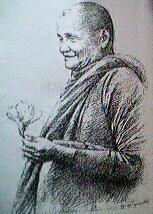 The main meal (lunch) is served at 11:00, because the Vinaya states that bhikkhus must only eat between dawn and midday. Before the meal, there two monks go up to the servery and two or three lay people officially "offer" them the food. After this ceremony, there is chanting, which mostly is dedicated to someone by someone else who brought a donation of food (dana) just offered to the monks. After chanting, the monks, followed in order by the nuns, the anagarikas (pre-novice monks) and lastly the anagarikaas (pre-novice nuns) walk up to the servery to serve themselves their last meal of the day. After the monastics have all served themselves, the most senior monk rings a bell signaling that the laity may now go get some food, as well. There is always more than enough food; it's mostly very English: potatoes, carrots, cabbage, bread, lentils, or other beans, apples and bananas for dessert. However, many Thai and Sri Lankan laity do bring very tasty dishes from their home countries, so occasionally we have daal, pineapple, coconut and other very exotic (i.e. non-English) food, as well.
The main meal (lunch) is served at 11:00, because the Vinaya states that bhikkhus must only eat between dawn and midday. Before the meal, there two monks go up to the servery and two or three lay people officially "offer" them the food. After this ceremony, there is chanting, which mostly is dedicated to someone by someone else who brought a donation of food (dana) just offered to the monks. After chanting, the monks, followed in order by the nuns, the anagarikas (pre-novice monks) and lastly the anagarikaas (pre-novice nuns) walk up to the servery to serve themselves their last meal of the day. After the monastics have all served themselves, the most senior monk rings a bell signaling that the laity may now go get some food, as well. There is always more than enough food; it's mostly very English: potatoes, carrots, cabbage, bread, lentils, or other beans, apples and bananas for dessert. However, many Thai and Sri Lankan laity do bring very tasty dishes from their home countries, so occasionally we have daal, pineapple, coconut and other very exotic (i.e. non-English) food, as well.After the main meal, about 6 or 7 people, who had previously signed up, go to the kitchen to clean up. The rest of the people (there are about 60 people including monastics and laity at the monastery) have free time until 2:00pm. Some people nap, others read, and others go for a walk or just have a chat.
At two in the afternoon, we meditate in the shrine room for one hour. At 3:00pm, an hour is set aside for walking meditation. At four we return to the shrine room for another hour's sitting meditation.
All of the meditation sessions are optional. Some people choose to do other things during the times scheduled for meditation and that's okay.
At 5:00pm, we have tea (This IS England!). But, while we're enjoying our tea with milk (be it soya or cow's), we engage in other activities: sutta classes, Dhamma discussion groups, films, yoga classes, laypeople's meetings. These activities likewise are optional.
At 7:30, we enjoy one last hour of sitting meditation, which so far as I've witnessed, everyone attends. This last sitting is followed by a brief puja to end the day. Afterwards, everyone returns to their rooms for sleep.
 Every Thursday, a monastery van takes up to ten people (who've signed up previously) for trips to town: alternating between Berkhamsted - the closest village - and Hemel Hempstead - the nearest town -. We stay in town for two answers, during which time we can go to the library, get cash at the ATM ("cash point" in British English), go shopping for toiletries, etc. or do whatever else we feel like doing.
Every Thursday, a monastery van takes up to ten people (who've signed up previously) for trips to town: alternating between Berkhamsted - the closest village - and Hemel Hempstead - the nearest town -. We stay in town for two answers, during which time we can go to the library, get cash at the ATM ("cash point" in British English), go shopping for toiletries, etc. or do whatever else we feel like doing.Thursday, November 24, 2005
Shiny Happy People
Meet me in the crowd
People people
Throw your love around
Love me love me
Take it into town
Happy happy
Put it in the ground
Where the flowers grow
Gold and silver shine
Shiny happy people holding hands
Shiny happy people laughing
Everyone around love them, love them
Put it in your hands
Take it take it
There's no time to cry
Happy happy
Put it in your heart
Where tomorrow shines
Gold and silver shine
Shiny happy people holding hands
Shiny happy people laughing
by R.E.M.

